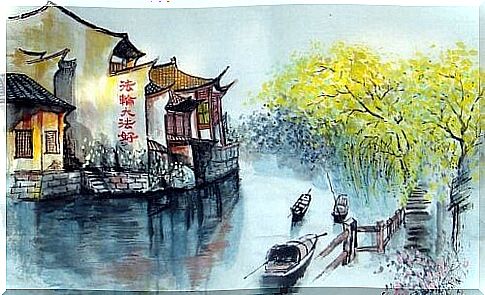Crossing The River: An Old Zen Story

As an old Zen story tells, there was once a master who was responsible for the training of his two young disciples. They were both very good students, selfless and disciplined. They both wanted to develop and become Zen masters themselves. Every day they did everything they could to achieve this.
What the master mainly tried to teach them was the idea of letting go. In Zen philosophy, attachment is the main source of suffering. Liberating oneself, living and letting others live is the main goal of Zen philosophy. The path to freedom is the path to peace and it is an important ingredient in achieving happiness.
This old Zen story tells us that the two young students in every way they could tried to be less and less dependent on other people and things. They ate only what was necessary. They even fasted on certain days and they did so with joy. Their clothes were simple. Their rooms and beds were spartan. None of this was perceived by them as a sacrifice because they were trying to improve themselves.
Our Zen story begins one day when the master asked his two disciples to accompany him to a nearby village. They would take food to the village, because this village was very poor. The story goes that both students accepted this invitation with great enthusiasm. In fact, they offered to carry very heavy baskets on the way there. When they arrived at the village, they humbly gave away the food. They were happy to be of service to others.
When the time came to return home, the Zen master asked them to take a walk through a forest near the monastery. It was early and all three looked at the beauty of the flowers, the sky and the animals. There was also a river nearby. What could give them more joy than drinking from the crystal clear water?

They walked for a long time in complete silence. They enjoyed the feeling of the sun and the wind on their faces. They smelled the plants and listened to the birds singing. After a while they came to a river. They could not have imagined what they would find there: a beautiful woman smiling at them.
The two young monks were struck by the beauty of the strange woman. She was the most beautiful woman any of them had ever seen. They both became very nervous and started walking. Slow at first, and then faster. They stumbled and fell. They completely forgot what they were doing and only had eyes for her.
When she saw how confused they were, the woman smiled flirtatiously at them. She then asked them in a seductive voice to help her cross the river. One of the young men rushed to help her. He took her in his arms when the woman looked at him suggestively. The young monk smiled. Then he crossed the river and put her on the beach on the other side. He returned to where he had left his master and the other monk.
The master looked closely at his young disciple and then they continued on their way. The other monk waited, curious to see what would happen. He looked at the master and looked at his companion. Then he pressed his lips together, but he said nothing. They came to the monastery in silence.
The days passed and the monk was still waiting. He did not understand why the master had not said anything about his companion’s inappropriate behavior. How was it possible that the other monk gave in to the woman’s charm and helped her right in front of his master? Just thinking about it made him angry.
The other monk was calm. He continued with his regular routine and did not even notice the anger of the other disciple. His relationship with his master was the same as before. None of them ever mentioned what happened to the beautiful woman. The disciple’s anger began to grow. One day he decided he could not stay any longer and complained to his master.

“How is it possible that you did not say anything to him even though he left you by the river to go and flirt with the strange woman? Are you not going to say anything to him? Why do you not scold him for his selfishness and lack of consideration? Why do you not punish him for giving him his will? ” said the monk to his master.
The master sat for a while and watched his student in silence. Then he said something that the monk would never forget: “Your companion picked up the woman and helped her by carrying her across the river. But he also left her there. You, on the other hand, still carry the woman and the whole event in your mind ”. What do you think was the moral of this old Zen story?









